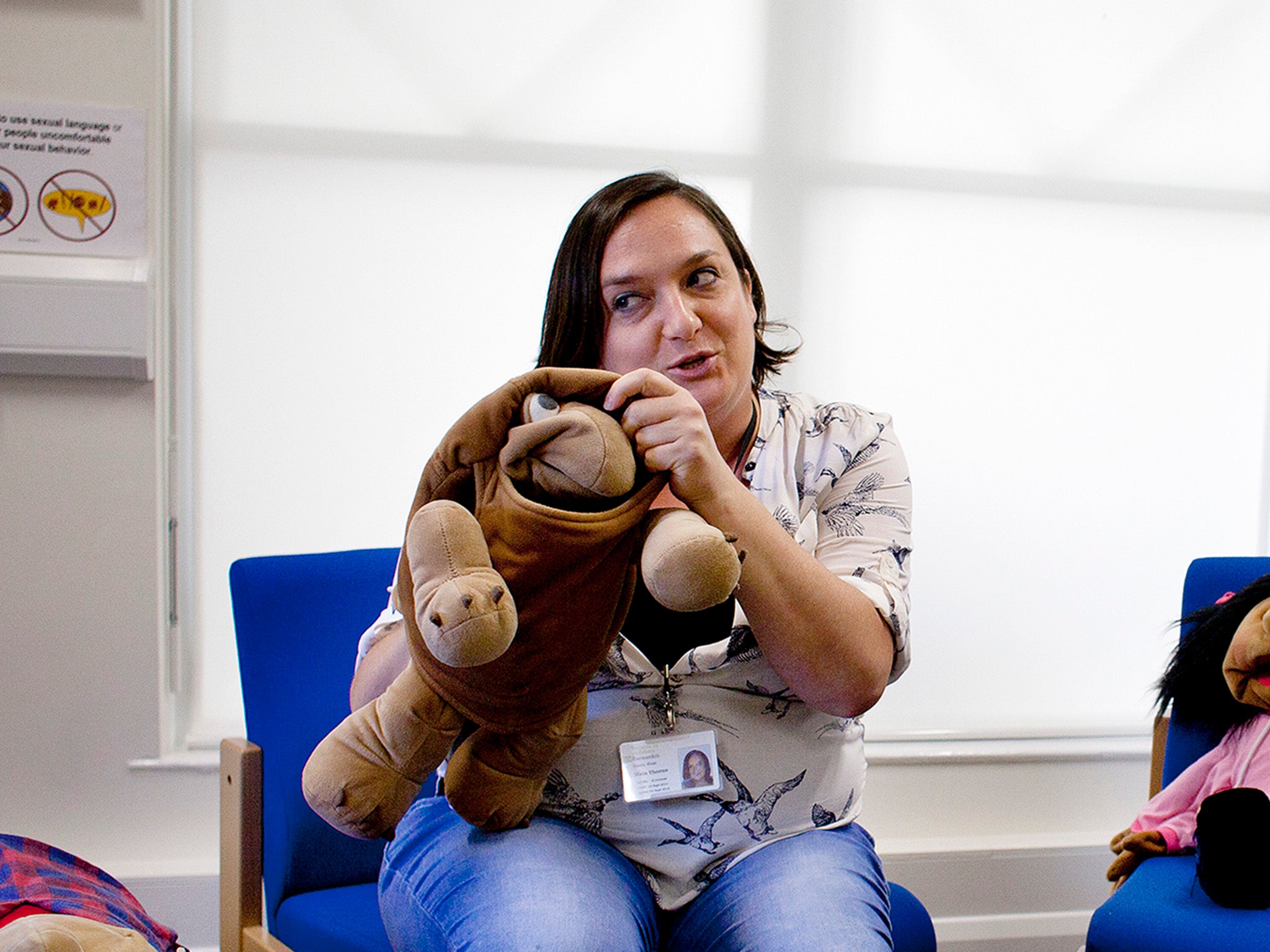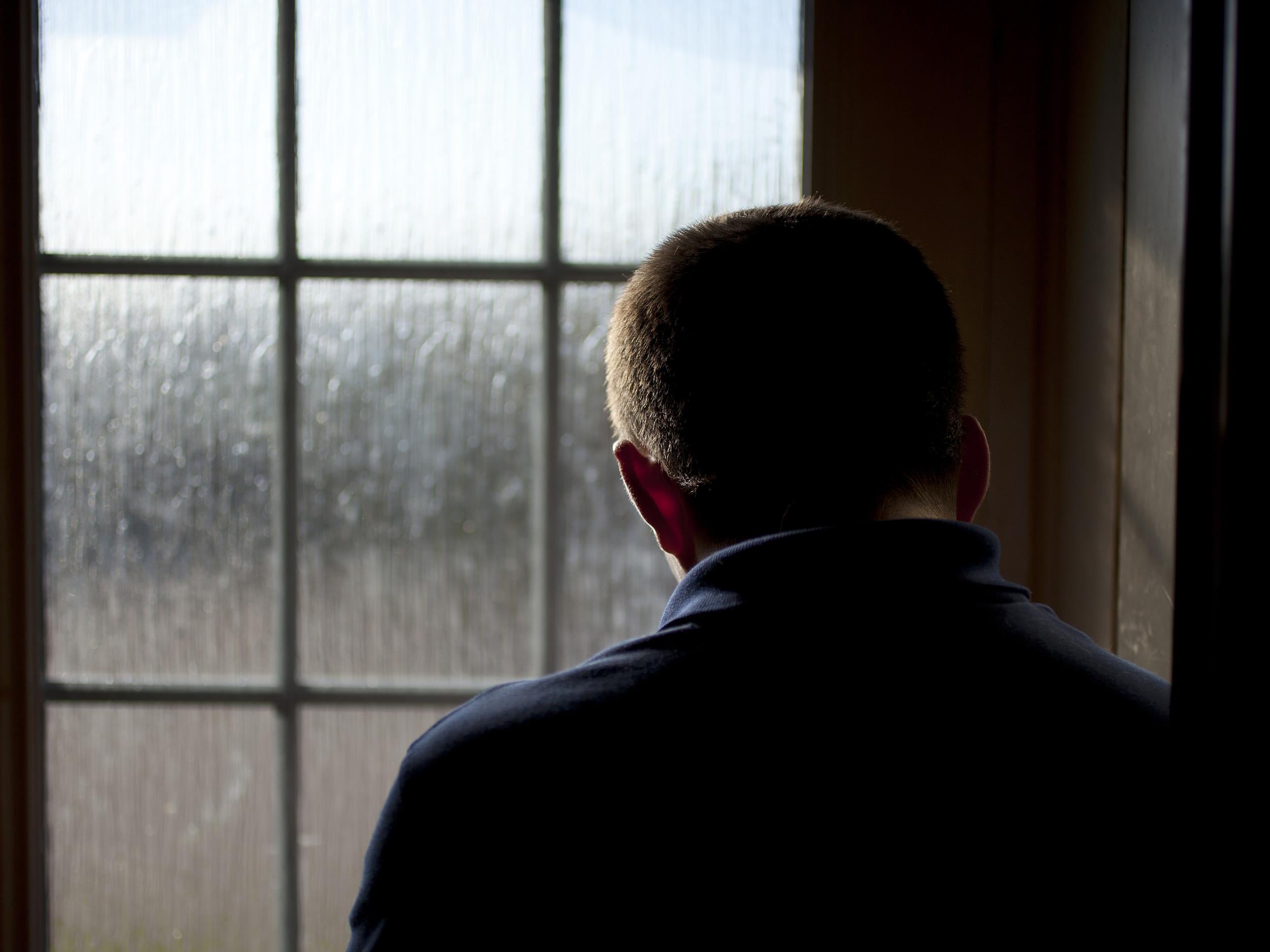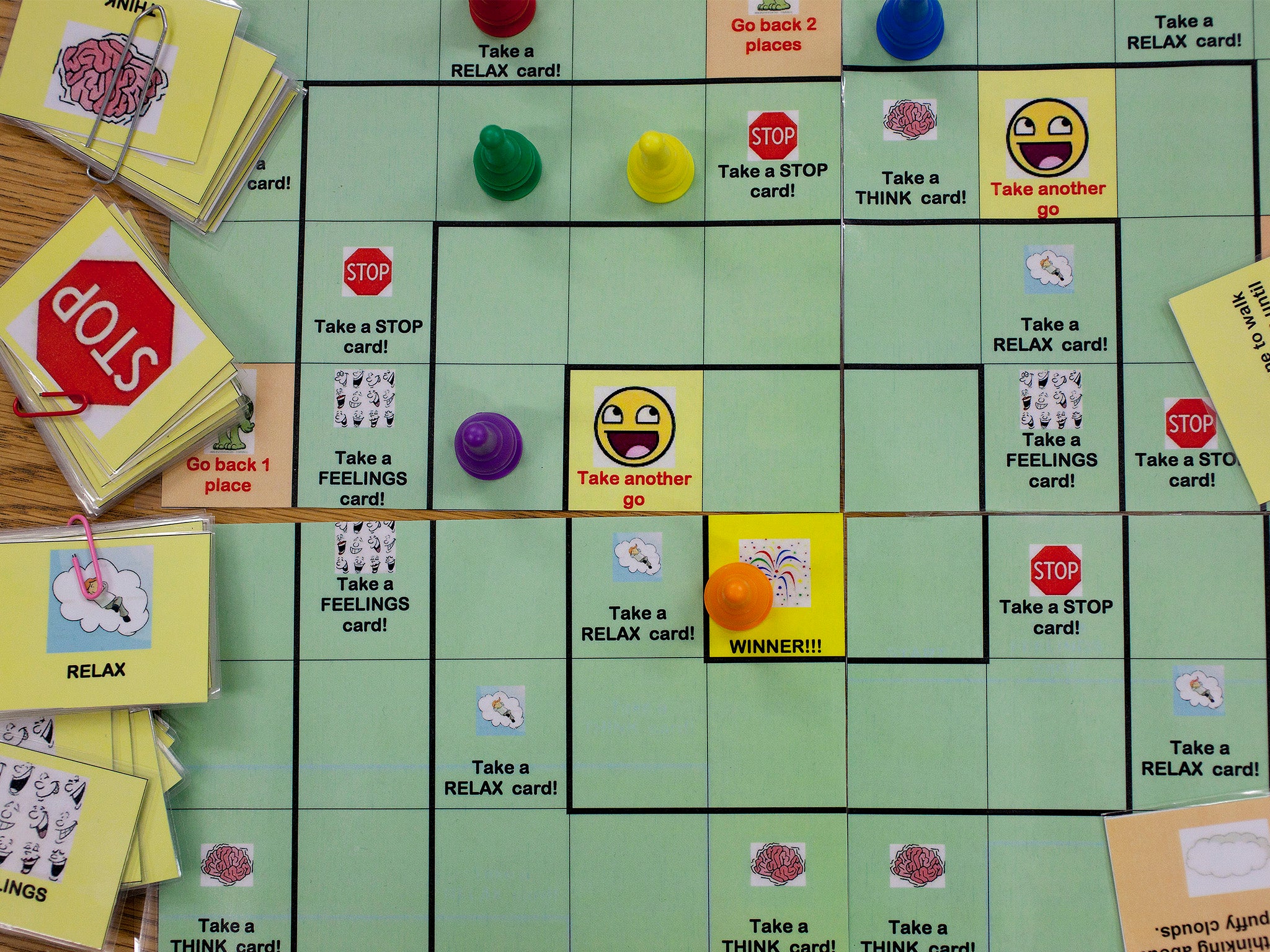How puppets can stop vulnerable children from becoming sex offenders
The children involved go there because they have been caught engaging in worrying or harmful sexual behaviour

Your support helps us to tell the story
From reproductive rights to climate change to Big Tech, The Independent is on the ground when the story is developing. Whether it's investigating the financials of Elon Musk's pro-Trump PAC or producing our latest documentary, 'The A Word', which shines a light on the American women fighting for reproductive rights, we know how important it is to parse out the facts from the messaging.
At such a critical moment in US history, we need reporters on the ground. Your donation allows us to keep sending journalists to speak to both sides of the story.
The Independent is trusted by Americans across the entire political spectrum. And unlike many other quality news outlets, we choose not to lock Americans out of our reporting and analysis with paywalls. We believe quality journalism should be available to everyone, paid for by those who can afford it.
Your support makes all the difference.A group of young children are sitting in a circle listening to stories delivered by two turtle glove puppets. The scene could be one of bygone innocence but the puppets are not telling nursery rhymes, they are talking about sex.
The turtles, called Toby and Terri, are being controlled by therapeutic councillors in Bristol to teach a small group of children how to control their sexual urges. This is the first project of its kind in the country, intervening early when children show signs of harmful or problematic sexualised behaviour.
The children, who range in age from four to 12, come here because they have been caught engaging in worrying or harmful sexual behaviour. The youngest may have been caught isolating other children to touch them in sexual places. For the oldest children, the offences could be as serious as rape.
By acknowledging how young these problems start – and confronting them – it is hoped the programme could help prevent future dysfunction and, in extreme cases, stop a new generation of sex offenders from developing. No journalist has ever gained access to the project, called Be Safe, until now.
The pioneering education programme was first tested in Oklahoma 20 years ago with great success: a randomised control trial in 2006 showed it had been far more effective than other measures in tackling harmful sexual behaviour. It is now used in several locations across America and Canada – and, for the last two years, in Bristol.
All but one of the children graduating from the Bristol programme so far have seen either a reduction or total elimination of their behaviour, according to monitoring of children six and 12 months after they complete the course. All had been referred to the course by social workers, teachers or their parents.
Trisha goes every week with her six-year-old niece Mary, who is half-way through a course. She is the girl’s guardian now after Mary was neglected and suffered probable sexual abuse with previous carers.
Trisha explains: “The social worker told me ‘yes, we think she may have gone through certain things’, but they didn’t know who it was or what had happened.
“It wasn’t until she played a game with my four-year-old son she called the ‘Special Game’ that I got an idea of what she had gone through. She told me when she played it before that she was the princess and would go on a special chair up the stairs, then go into this man’s bedroom and be saved from a dragon. He would kiss her all over and then they would ‘get married’. The game she played with my son was that they were married. She tried to kiss my son and undo his nappy.”
Trisha is convinced from Mary’s behaviour, which includes acting out sexual behaviour with toys, that she was raped. She tried to take the case to the police but they did not take it further, saying her case would be too difficult to prosecute. With Mary, the worry is that without intervention she’ll easily fall victim to sexual predators again later in life.
Trisha explains: “She doesn’t have a safety barrier; she feels safe with anyone.” Twice her aunt has seen her run up and wrap her arms around male strangers, burying her face in their groins.
Maia Thorne, a therapeutic counsellor working with Mary, says: “Because her boundaries have been eroded by adults she’s got a warped sense of affection because that’s the kind of attention she’s received.”

Despite being only halfway through the programme – which includes tandem workshops with parents and carers – Trisha says she has already noticed signs of improvement in Mary. “It’s helped her an extreme amount. It helps her deal with the right way to approach people. Without this, I believe that she would’ve gone down the route of her mum which is to try and find affection from anybody and being very vulnerable.” Mary is in a minority on the course – girls are outnumbered by boys by a ratio of four to one. In other ways, though, she is typical. Around 85 per cent of the children being helped have a history of abuse themselves, though it is not necessarily sexual – it could be physical, emotional, or witnessing domestic abuse.
Because her boundaries have been eroded by adults she’s got a warped sense of affection because that’s the kind of attention she’s received
Mel Turpin, a clinical psychologist on the project, says: “One of the biggest challenges is people either see a child as an abuse victim or they see them as someone who’s harmful and demonise them. But actually children can be a victim and harm others and people find that hard to hold onto.
“For me the saddest thing can be tracking back through the child’s history and seeing lot of things have happened that have been recorded by different agencies and nobody’s done anything. I find it really sad that perhaps we don’t see someone until they’re 15 and you go back and realise it’s been happening for a long time.”
Often the children will not understand the severity of what they are doing and are simply repeating behaviour they have witnessed in adults. Ms Thorne explains: “I’ve worked with an eight-year-old who at a younger age was threatening consistently that he was going to rape someone to intimidate them. It’s a repetition of a narrative they had lived themselves, so when provoked and feeling traumatised they would be lashing out with a verbal narrative of violent rape and other sexual acts. We strongly suspected that’s something he’d seen at home.”
The aim of the project is to act early in childhood to stop behaviour turning into something more serious – and potentially even dangerous. Stephen Barry, who manages the service, says: “We’re not just thinking about the children and young people we work with but also others who could be at risk from their behaviour. By intervening earlier we’re stopping these behaviours becoming more entrenched.”

Playing is a big part of the way children are taught to manage behaviour. The puppets are used to teach “Turtle Steps”, four simple rules to follow when a child feels an urge to do something inappropriate. Toby and Terri act out role-plays to try and teach what’s OK and what’s not. In one scenario, Terri the turtle goes off to use the bathroom and Toby peeks at her. The counsellor asks, “is it a good idea?” and the kids all shout back “no!”
Among Kerplunk and the other standard board games stacked in a social room are titles that hint at some of the problems faced by these young people, including The Dinosaur’s Journey to High Self-Esteem and The Anger Solution Game. An impulse control game open on the table has cards asking questions like: “Is it OK to touch the private parts of animals?” and “Is it OK for you to show other people your private parts?”
The question of how to define when children’s behaviour becomes problematic – rather than normal exploration – is difficult to answer when society is horrified by confronting any sexual urges in young people.
Mr Barry says: “Sexual behaviour weirds us out anyway. People struggle with the idea that adults are sexual beings and even more so that children are sexual beings. Sexual behaviour in children is quite normal but it’s when it steps into that inappropriate behaviour that we come in. Four-year-old boys and girls like to touch themselves, for example, but it’s not OK to do that publicly or to coerce others.”
The group work is aimed at eight- to 12-year-olds, so when the project works with children younger than that, they are typically helped in shorter one-to-one sessions. Mr Barry says: “We’ve had a number of cases of children aged four or five where they’ve chosen to go off in secret and isolate other children to touch them inappropriately. And the behaviour didn’t appear to be mutual either, so there was clearly coercion.”
Though designed for younger children, the Turtle Steps have also been adapted for young people with special needs. Adam is 13 and has learning difficulties. Sitting at home with his mum Jane, a year after finishing the project, he goes very quiet when asked what he did to end up on the course. Later Jane explains that he was referred to the service after forcing a vulnerable younger boy to give him oral sex in the school toilets.
“I can still remember the Turtle Steps and the rules,” Adam says, before reeling off five sexual behaviour rules on his fingers: “No touching; no looking; no using sexual language or references that might upset or harm other people; allowed to touch private parts but only in a private place and not for too long; not allowed to show your private parts to anyone else.”
He is shy talking about the programme but Jane says it has been useful: “There haven’t been any problems or issues with him since.”
While the younger children’s programme has only been running for two years, the Be Safe centre has been working with problematic sexual behaviour in over-11s for the last eight years. Sam is one of the older kids helped by Be Safe. He was referred by police when he was 13 after sexually assaulting his four-year-old step-sister.
Sam’s step-mother, Rebecca, who supported him through the project, spoke to The Independent. “I found out what had happened because my daughter told me. He had licked her and tried to stick his finger in her vagina. As someone who experienced abuse as a child I was devastated by my inability to keep my daughter safe.
“He was given a police caution and had to do eight mandatory sessions at Be Safe. We felt it was the most helpful thing for him. I can honestly say it’s made him a much better person and I do believe he’s truly sorry for what he’s done. I feel confident that he won’t sexually offend again now because I think he knows to stop himself and to be extra cautious. But as a mother with a daughter – and a survivor – I feel that I will remain on guard because I can’t live with the idea of letting something happen a second time.”
With older children the turtles are left in the cupboard, but the same techniques of learning to control emotions and behaviour using role play and set rules are used, as well as counselling to get them to confront the seriousness of their actions.
Despite its success, there is concern about the project’s future. It currently relies heavily on Big Lottery Funding which runs out next year. As Mr Barry puts it, the problem is one of image. “You can’t fundraise for this the way that other charities can. How do you get past the stigma that this child is a ‘paedophile’, as the tabloids would have it?”
The names in this story has been changed
Join our commenting forum
Join thought-provoking conversations, follow other Independent readers and see their replies
Comments